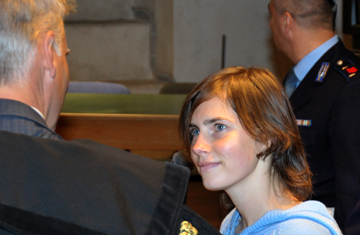
Amanda Knox, with her lawyer Carlo Della Vedova, arrives for a hearing for her appeals trial, in Perugia's courthouse, Italy, Wednesday, Nov. 24, 2010
The biggest factor in the appeal trial of Amanda Knox, the American college student convicted last year of killing her British roommate Meredith Kercher, is unlikely to be the disclosure of dramatic new evidence.
When lawyers for Knox and her Italian co-defendant Raffaele Sollecito lay out their reasons for appeal on Saturday, they're expected to concentrate on well-worn technical objections to the way the DNA evidence was gathered, in particular the kitchen knife alleged to be the murder weapon and a bra clasp picked up in a sweep some six weeks after Kercher was found stabbed to death in the apartment she shared with Knox in the Italian city of Perugia in 2007. "What we're primarily asking for is a new examination of the procedures," Knox's lawyer, Luciano Girgha, told TIME. Speaking earlier to reporters after a 15-minute procedural session in November, "The game," he had said, "is starting over."
But while the arguments are not expected to be new, they will be falling on a different set of ears. The presiding judge, Claudio Patillo Hellmann, has a reputation for overturning convictions, and the five women and one man who make up the new jury are required by law to have a higher minimum standard of education than those who sat on the original trial, which could make a difference when it comes to evaluating contentious DNA evidence.
Most important, however, is the change in Italian public opinion. Unlike in the U.S., where jurors are carefully screened for bias and sequestered during the proceedings, in Italy they are known as "civilian judges," and are free to hold preconceived opinions and to drink deeply from the media well. Indeed, in Knox's first trial, the jury foreman was a criminal lawyer whose firm had briefly participated in the investigation.
Celebrity trials, almost by definition, take on lives of their own outside the courthouse, as facts and testimonies kaleidoscope under the gaze of the television cameras. But while the original trial took place in a charged atmosphere of tabloid controversy and weekly revelations, this new one is likely to unfold sedately in a media environment more favorable to the defendants.
In the year since Knox and Sollecito were found guilty of murder, several books have been published on the crime and the resulting trial, many of them critical of the prosecution. At least two movies are in production. And the lead prosecutor in the earlier trial was convicted of misconduct in a separate case in January, adding to the public perception that he may have overstepped his bounds in his case against Knox.
When Knox appeared in court at the start of her appeal trial on Nov. 24, she seemed deflated and tired, thinner than a year earlier when she often smiled during the proceedings. "I can't manage anymore to believe that this girl was able to do what she was accused of," says Rocco Girlanda, an Italian parliamentarian who visited Knox in the penitentiary some 20 times and published a book about their conversations: Take Me With You — Talks with Amanda Knox in Prison. "As a member of parliament, I talk every week to hundreds of people, from all walks of life. I can assure you that more and more people are beginning to think that Amanda is completely different from the way she's been described [by the prosecution and the media] and she can't be guilty."
For lawyer Girgha, the shift in how Italians view his client is welcome, but not a reason to lose focus on questioning the evidence. "This makes us happy, of course," says Girgha. "But what counts, counts. The trial is made of facts, of witnesses, of testimony."
After all, the appeals trial is expected to drag on for months, providing more grist for the tabloid mill. The prosecution has also filed an appeal, opening Knox and Sollecito to the risk of further jail time if the court rules against them. And later this month, Italy's high court takes up the final appeal of Rudy Guede, the Ivorian immigrant who was convicted in a separate, fast-track trial, of joining Knox and Sollecito in the murder. Meaning there could be new revelations yet to come.
